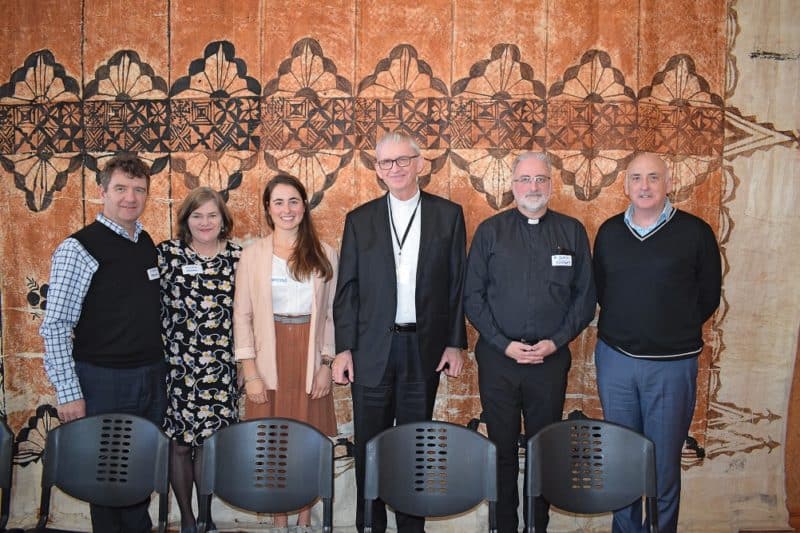The New Zealand Catholic Bishops Conference president, Bishop Patrick Dunn, called on Catholic health professionals to remember always that their vocations are deeply rooted in Catholic traditions. He did this as he welcomed the formation of the New Zealand Catholic
Medical Association.
Around 70 health professionals from various parts of the country gathered at the inaugural meeting of the association held at St Michael’s School hall in Remuera,
Auckland, on May 25.
“On behalf of the NZCBC, I would like to thank you all for being here [and] to thank the little team who dreamed the dream. The bishops see this as a very important and wonderful initiative, and we are very grateful to those who have taken these first steps. But also, to all of you who have come this morning,” Bishop Dunn said.
Bishop Dunn extended to the group Palmerston North Bishop Charles Drennan’s special regards. Bishop Dunn also announced the appointment of Fr Joseph Grayland as chaplain for the association. Fr Grayland is parish priest of Our Lady of Lourdes parish in Palmerston North.
Bishop Dunn said the Church has long been involved in the medical profession as part of carrying out the corporal works of mercy. He said this is why many hospitals are named after the great saints who were in the health care apostolate.
“It’s comforting to remember that we’ve got very deep roots in our apostolate, a precious vocation that we have, that is very much part of our tradition,” he said.
“I believe if this organisation gets off the ground, it will be a huge and very positive initiative to replace the work done in the earlier decades by the Guild of St Luke, St Cosmos and St Damian,” he said.
Dr Christina Noetzli, one of the main organisers of the new association, acted as the MC. She explained the reasons for creating a national association, which include the need for a community, networking, guidance and education, pastoral care and connection with other Catholic organisations.
Dr Joseph Hassan and his wife Cushla, who is a nurse and the manager of their practice, also spoke on the importance of an association of Catholic medical and health practitioners. Focus on the Family director Wayne Mulqueen, the fourth formation committee member, was unable to attend, as flights into Auckland were cancelled due to fog that morning.
Auckland tertiary chaplain Fr Christopher Denham, who came to support them, reflected on St Paul’s understanding
“that we are, as disciples of the Lord, so close to him that we are, in fact, a part of him, the body of Christ”.
“I’d suggest that there is [in that understanding] a recognition of myself as a part, not a whole. Not just my concern for the other parts, but recognising that a part of my identity is that I am a part of something greater.
There is, in that, both a support and a challenge,” he said.
Fr Grayland, for his part, told the group there were two things they needed to remember: vocation and Baptism.
“Ultimately, our vocation is not to a job, but to Christianity,” he said. “As you are discussing the way in which the association can meet, how it can meet, who it can nurture, come back again to the foundational call, which is the call to Christianity.”
At noon, those present went to Mass, which was celebrated by Bishop Dunn, with the other priests as concelebrants.
After lunch, those present met again to discuss the future of the organisation.
“We shared our perspectives, the issues we found challenging and the benefit [of] being in this organisation. We gathered ideas [on] what they were looking for,” said Dr Hassan.
“From here, we will organise another meeting. We encouraged people from each of the dioceses to consider whether they can support each other in their local areas.”
Dr Noetzli said it was really inspiring to be with like-minded people, particularly as there was a large group of young people who attended the meeting.
She said nothing was set in stone as of yet.
“Our two main goals will still be to provide that pastoral care for people, mainly through the chaplaincy role, to have them available to people,” she said. “The second thing is to foster and grow that sense of community and connection between people.”
The suggestions being looked at are: forming groups within each diocese, organising talks on life issues, mentorship programmes and retreats.
Dr Noetzli said they are encouraging people who weren’t able to come to the inaugural meeting, but who want to join the group, to contact them.
Some doctors from Christchurch were unable to attend because of flight cancellations.

Reader Interactions